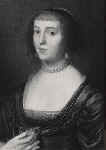Elizabeth Stuart
|
 |
Elizabeth was the eldest daughter of James I. (1566-1625) of Great Britain and Anne of Denmark (1574-1619). She was born at Falkland Castle in Fifeshire Scotland in August 1596. Despite opposition from her mother, she married the Elector Palatine Friedrich V. (1596-1632) on 14 February 1613.
In August 1619, a few months after the death of the emperor Matthias (1557-1619), the estates of Bohemia, being sympathetic to the Protestant cause and dissatisfied with the rule of the Catholic Habsburgs, declared Mathias' successor, Ferdinand, later the emperor Ferdinand II. (1578-1637), deposed and chose Friedrich as their king, thus precipitating what became the Thirty Years' War. Reluctant at first to accept the appointment, Friedrich finally acquiesced and was crowned king of Bohemia at Prague on 4 November 1619. Elizabeth, who had accompanied her husband to Prague in October 1619, was crowned queen three days later, on 7 November. In Prague her high spirits and levity offended many of the citizens; but many others came to be charmed by her great beauty and grace, for which she was widely known as "The Queen of Hearts."
After Friedrich's coronation, the emperor Ferdinand II. took the offensive. Friedrich received no assistance from either England or the German Protestant Union, which he headed and which had been founded by his father to protect Protestant interests, and thus he had few soldiers and little money. As a result, his forces were easily routed by the imperial army under Johann Tserclaes, Graf von Tilly, (1559-1632) at the battle of the White Mountain on 8 November, just a year and four days after his coronation. The Habsburgs had predicted that Friedrich would be a winter king, gone with the melting snow, and when the prediction proved true after Friedrich's defeat at the battle of the White Mountain, he was forever burdened with the epithet "Winter King." He and Elizabeth withdrew in exile to The Hague, from where they could only watch helplessly as Spanish troops took possession of the Rhenish (Lower) Palatinate. Friedrich was placed under imperial ban, and in 1623 his Upper Palatinate (adjacent to Bavaria) and his electoral dignity were given to Maximilian I. (1573-1651) of Bavaria as a reward for fighting on the Habsburg-Catholic side in the Thirty Years' War. He died at Mainz on 29 November 1632.
Friedrich and Elizabeth had thirteen children. Among them were Karl Ludwig (1617-1680),1 who regained the Palatinate at the Peace of Westphalia in 1648; Elizabeth (1618-1680), abbess, friend and philosophical correspondent of the philosopher Descartes (1596-1650); and Sophie (1630-1714), later electress of Hanover.
![]()
Notes
1Karl Ludwig's daughter, princess Elisabeth Charlotte (1652-1722), married Philippe I. (1640-1701), the duke of Orléans, and became the ancestress of the elder and Roman Catholic branch of the royal family of England. Her namesake, Sophie Charlotte (1668-1705), later electress of Brandenburg and queen of Prussia, was the daughter of Karl Ludwig's sister, Sophie (1630-1714), later electress of Hanover.
Sources
- The Encyclopædia Britannica, 13th edition. New York: The Encyclopædia Britannica, Inc., 1926.
- Ragnhild Marie Hatton, George I: Elector and King. Cambridge, Mass.: Harvard University Press, 1978.
- Parker, Geoffrey. The Thirty Years' War. New York: Routledge & Kegan Paul, 1987.
Web





